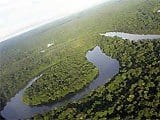 Van Gardingen, Paul; Valle, D. & Thompson, I.
Van Gardingen, Paul; Valle, D. & Thompson, I.
The sustainability of a range of forest management scenarios were evaluated for the Tapajo´s region of the Brazilian Amazon using the growth and yield simulation model, Simflora, a derivative of the model SYMFOR developed for application in Indonesia. A simulation of current management regulations based upon a maximum extracted volume of 35 m3 ha and a 30-year cutting cycle was found to be unsustainable. A range of alternative specifications for the control (regulation) of harvested timber yield were compared, along with associated estimates of timber increment and description of the ecological composition of the stand. The alternative scenarios included cutting cycles ranging from 10 to 60 years and maximum yields from 10 to 40 m3 ha. The maximum commercial volume increment predicted in this study was 0.33 m3 ha. It was observed that the highest rates of volume increment were associated with high logging intensities. The study produced a limited number of potentially sustainable options for the Tapajo´s forest. The best of these were the combinations of 10 m3 ha yield and a cutting cycle of 30 years or 20 m3 ha with a 60-year cutting cycle. The analysis suggested that the sustainability of both of these options was ‘‘marginal’’ and suggested adopting a precautionary approach of an additional limit for yield to be no more than 33% of standing commercial volume until more data are available. Analysis of the ecological data from the simulations clearly demonstrated that the composition of the managed forest is likely to differ significantly from that observed in primary forest. The most significant likely change is a reduction in the proportion of trees in the emergent ecological group. This observation raises the issue that stakeholders should not expect tropical forests that are managed for production to ever be identical in structure or composition to primary forests. It also suggests that additional technical measures will be required to promote the regeneration and growth of current emergent species if these are to be maintained in managed forests in the Amazon. The study concludes that there cannot be a single system of yield regulation or forest management that will fit all contexts (social, ecological, environmental and economic) or management objectives held by various stakeholders in the Amazon.
This article is available to subscribers at Forest Ecology and Management website ( http://www.elsevier.com/locate/foreco ).
